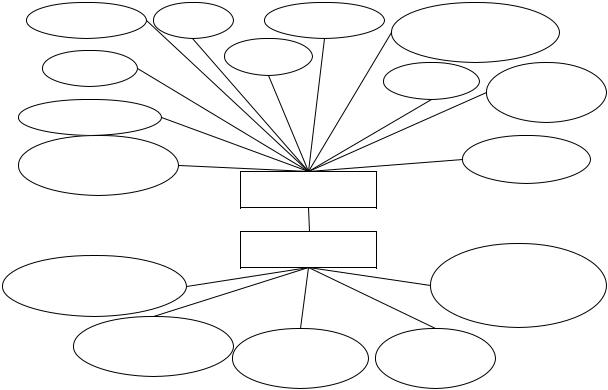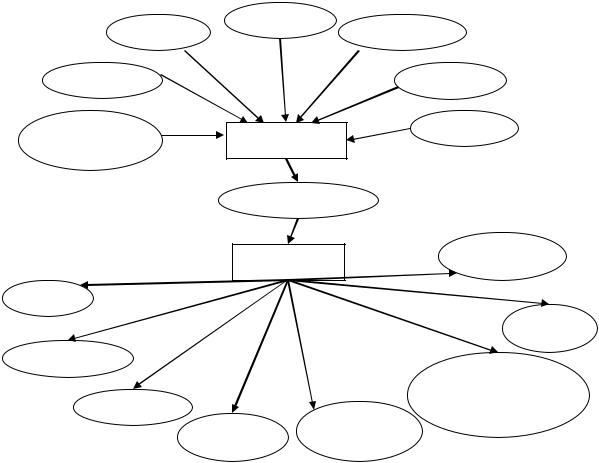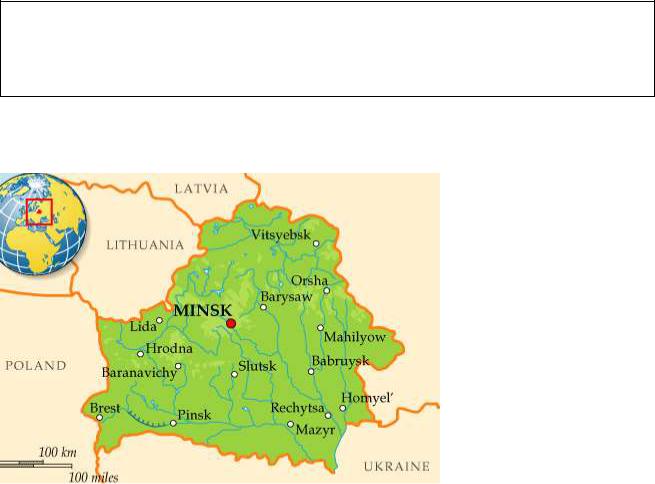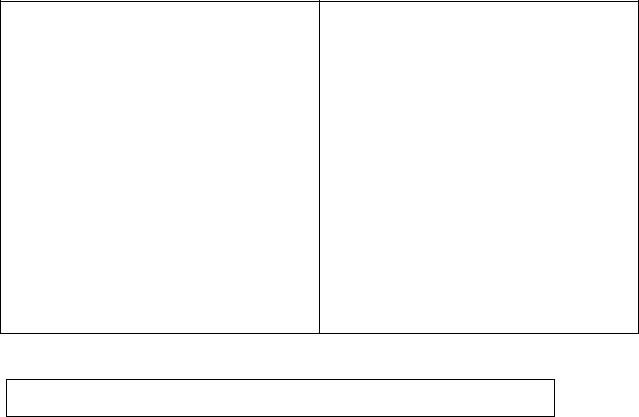
Устная речь
.pdf
b)the United Kingdom is traditionally very strong in manufacturing. Heavy industries such as iron and steel, coal mining, and ship building declined in the late 20th century.
c)heavy industries such as iron and steel, coal mining, and ship building are underdeveloped.
2.The production of fuels dominates the country's mining industry. The United Kingdom usually produces enough oil so that it does not need to buy any from other nations. The country also has large reserves of natural gas and coal. Coal mining was once a huge industry in the United Kingdom. However, …
a) it has one of the world's largest reserves of potash (potassium salts), which is used when making fertilizers.
b) it is also a world leader in the production of peat. Peat is a vegetable tissue formed by the breakup of various plants in water. It is formed into briquettes and used as fuel.
c) coal production dropped greatly as the country began switching to other fuels.
3.The country's farms are very efficient and use many specialized machines. Less than 2 percent of the workforce is employed in agriculture. Farmers raise cattle, sheep, and pigs. The British livestock industry was hurt by an outbreak of mad cow disease in cattle beginning in the 1980s. …
a) The chief crops include barley, wheat, sugar beets, and potatoes.
b) It is the world's largest producer of rice and is among the leading sources of wheat, corn, tobacco, soybeans, peanuts, and cotton.
c) The country leads the world in the production of chickens, and eggs.
14.The network below shows the most important types of industry in the UK.
Chemical |
Coal |
Petroleu |
Paper and |
|
|
|
Metal |
paper products |
|
Aircraf |
|
|
|
|
|
|
Textile |
|
|
|
|
|
Food |
|
Shipbuildin |
|
|
|
processin |
|
|
|
|
|
Motor |
|
|
|
Clothing |
vehicles and |
|
Types of Industry |
|
|
|
|
|
|
|
|
|
Equipment |
|
|
Electronic power |
|
|
|
Electronics and |
|
|
|
communication |
|
equipment |
|
|
|
|
|
|
|
equipment |
|
|
|
|
|
|
Automation |
Railroad |
Machine |
|
|
equipment |
|
|||
equipment |
tools |
|
||
|
|
|
||
11

15. How much do you know about Great Britain’s imports and exports. Examine the network and share this information with your groupmates.
Fuels |
Vehicles |
Machinery |
|
||
Chemical |
|
Footwea |
Electrical |
Imports |
Clothing |
|
|
|
goods |
|
|
Great Britain
Exports |
Beverages |
|
Oil
Food
Chemicals
|
|
|
Electrical and |
Machiner |
|
|
electronic |
|
|
equipment |
|
|
|
Aerospace |
|
|
Vehicles |
|
|
|
products |
|
|
|
|
|
II. 1. Comment on the following problems and quotations:
1.The British monarch reigns but does not rule.
2.“People who want to understand democracy should spend less time in the library with Aristotle and more time on the buses and in the subway.” Simeon Strunsky
3.“It is not the walls that make the city, but the people who live within them. The walls of London may be battered, but the spirit of the Londoner stands resolute and undismayed”. George VI (1895-1952)
2. Speak about
… the differences between the House of Commons and the House of Lords of the British parliament. Describe their activities and say what role they play in passing the laws which regulate the life of the country.
3. Make a poster for a tourist information centre in London.
III. Writing Section
1. Imagine you visited a place in Great Britain (e.g. the Tower of London, the British Museum, Westminster Abbey, Buckingham Palace, Hyde Park, etc.) you really liked. Describe it using the paragraph plan below.
12
Plan
INTRODUCTION
1)where the place is and why you went there MAIN BODY
2)further details about the place
3)what you saw and what you did there CONCLUSION
4)how you feel about the place and whether you recommend it or not.
2.An international travel magazine has asked its readers to describe a famous city. Write your description.
3.Your teacher has asked you to describe a visit to a place you will always remember. Write your composition.
4.A travel magazine is running a competition for the best description of a festival in Great Britain. Write a description for the competition.
5.Make up a quiz to test the students’ knowledge of Great Britain
IV. Project
You have just returned from the Students Scientific Conference in London. Plan a sightseeing trip around London for one day for those students who are going to take part in the conference next year. Plan to visit no more than four places and have a picnic lunch in a park.
13

Unit VI |
THE REPUBLIC OF BELARUS |
||
|
|
Vocabulary |
|
|
|
|
|
|
|
Nouns and Noun Phrases |
|
ancestor |
|
/'xnsestq/ |
предок |
antiquity |
|
/xn'tIkwqti/ |
древность |
aurochs |
|
/'O:rPks/ |
зубр |
ballot |
|
/'bxlqt/ |
голосование |
bondage |
|
/'bOndIdZ/ |
рабство, зависимость |
chamber |
|
/'CeImbq/ |
палата |
court |
|
/kO:t/ |
суд |
elevation |
|
/"elI'veISn/ |
возвышенность |
grove |
|
/grqVv/ |
роща |
lowland |
|
/'lqVlqnd/ |
низменность |
prosecutor |
|
/'prPsIkju:tq/ |
прокурор |
reservation |
|
/"rIzq'veISn/ |
заповедник |
suffrage |
|
/'sAfrIG/ |
голос, голосование |
supervision |
|
/"su:pq'vIZn/ |
надзор, наблюдение |
swamp |
|
/"swPmp/ |
болото |
|
|
Verbs and Verbal Phrases |
|
approve |
|
/ 'qpru:v/ |
одобрять, утверждать |
attain |
|
/q'teIn/ |
получить, приобрести |
be situated (in) |
|
/'sICueItId/ |
располагаться |
border (on) |
|
/'bO:dq/ |
граничить |
head |
|
/hed/ |
возглавлять |
rout |
|
/raVt/ |
обратить в бегство, разбить |
span |
|
/spxn/ |
простираться |
stick (stuck) |
|
/stIk/ |
прикрепляться, закрепляться |
swallow |
|
/'swPlqV/ |
поглощать, подавлять |
total |
|
/'tqVtl/ |
насчитывать |
|
|
Adjectives |
|
executive |
|
/Ig'zekjqtIv/ |
исполнительный |
immense |
|
/I'mens/ |
огромный |
judicial |
|
/Gu'dISl/ |
юридический |
legislative |
|
/'leGIslqtIv/ |
законодательный |
marshy |
|
/'ma:SI/ |
болотистый |
primordial |
|
/preI'mO:dIql/ |
исконный, первобытный |
representative |
|
/"reprI'zentqtIv/ |
представитель(-ный) |
supreme |
|
/su:pri:m/ |
высший, верховный |
14

Practise saying the following words:
Dregovichi |
/'dregOvICI/ |
Дреговичи |
Krivichi |
/'krIvICI/ |
Кривичи |
Radimichi |
/'rq'dImICI/ |
Радимичи |
the Grand Duchy of |
/'grxn 'dACI |
Великое Княжество |
Lithuania |
qv lITju: 'eIniq/ |
Литовское |
I. Oral Practice Section
1.Look through the following quotations and proverbs and try to outline the problems to be discussed.
1.Every man has a lurking wish to appear considerable in his native place.
2.Home is where the heart is.
3.A nation is a thing that lives and acts like a man and men are the particulars of which it is composed (J. Holland).
4.The nation’s honor is dearer than the nation’s comfort; yes, than the nation’s life itself (W.Wilson).
2. Check the meaning of the following words. Find all the suitable nouns for each of the adjectives or participles.
Principal, transport, rural, ethnic, economic, feedstock, energy, local, innovative, highway, forest, foreign, sovereign, manufacturing, local, constitutional.
Security, area, peasants, policy, court zone, network, equipment, tradition, reserve, crop, fuel, technology, state, center.
3. Make sure that you know the words. Read the definitions and match the words and definitions:
ancestor, antiquity, invade, annex, remain, rapidly, declare, to last, former, independence, primordial, bondage
|
to enter a country; |
a person in your family who lived long ago; |
|
old times; |
to say something officially or publicly; |
|
to take control of the country; |
still to be present after the other parts have |
|
to continue for a particular period of |
been removed, used; |
time; |
that used to exist in earlier times; |
|
|
existing at or from the beginning of the |
done or happening very quickly; |
|
world; |
freedom from somebody’s control. |
|
the state of being a slave or prisoner; |
|
4. Read the text. Fill in the gaps with the words from ex. 3. Put some verbs into the past form.
From the History of Belarus
Belarus is a new, sovereign state the history of which goes back to … . The first human being appeared on its territory about 120-140 thousand years ago. There are sites on the territory of Belarus dating 2600 years ago. The … of Belarusians who settled on the territory of present Belarus between the 6th and 12th centuries were
15

Krivichi, Radimichi and Dregovichi. They lived in the basins of the Dnieper and the Zapadnaya Dvina rivers. They hunted, fished and farmed. These tribes were separate, but they needed in a united state. It was Kievskaya Rus that appeared at the beginning of the 9th century.
In the 13th century the Belarusian territories were swallowed by the Grand Duchy of Lithuania. During this time Belarus was largely in peace, but the Lithuanian duchy was at war and by the 15the century the Grand Duchy of Lithuania spanned from the Baltic Sea to the Black Sea.
Later, at the end of the 17th century Belarusian people were placed in … to the
Polish feudal lords who exploited them cruelly.
It was also … by the troops of the Swedish King Charles XII. In 1708 the
Russian troops under the command of Peter the Great routed the Swedish troops and by the end of the 18th century Belarus was … by Russia until the 1st of January 1919 when the Byelorussian Socialist Republic was proclaimed.
In 1922 it became a member of the … USSR. In 1939 Western Belarus, occupied by
Poland, joined Byelorussia. During that period new plants and factories were built, national arts and literature, science and education developed … .
But World War II broke out and in 1941 Byelorussia was occupied by Nazi Germany. Over one million buildings were destroyed and the human losses totaled over two million Belarusians. The occupation … till 1944. In post-war years Belarusian people restored ruined cities and towns, rebuilt plants. During that time Belarus became a major manufacturing center in the Western region of the USSR.
Belarus … itself sovereign on the 27th of July 1990 and the former BSSR became the Republic of Belarus on the 25th of August 1991, attaining full independence.
5. Work in pairs. Speak of the main steps in the history of our country to your partner matching the dates and the events and arranging the facts in the right order.
6th -12th centuries; 13th century; 1708; January 1; 1919; 9th century; the end of the 18th century; 1922; 1941; July 27; 1990; 1939; 1944; August 25; 1991
6. Work in pairs. Restore the dialogue between Mike, a student from Belarus and Alex, a student from Australia. They are speaking about the history of the name
“Belarus “.
Alex: Hello, Mike. You know, people in our country know too little about your country. I’m interested in the history of it. Is Belarus the original name of your country?
Mike: No, it isn’t. Once it was called “White Russia” or “Belaya Rus”.
Alex: …
Mike: Surely. According to chronicles it was first mentioned in the 12th century. And the English “White Russia” was first used in the 16th century.
Alex: …
16

Mike: You know there are different versions of the name. Some researchers associate it with the direct meaning of the colour “belyi” or “white”. Of course, there are also other versions.
Alex: …
Mike: In the 19th century, for example, it was called “Belorussia”. And then the official name of the country was “Byelorussian Soviet Socialist Republic”, when the country was the part of the former USSR.
Alex: …
Mike: On 27th of July 1990 our declared itself sovereign and became an independent state. Now its official name is the Republic of Belarus.
Alex: …
…Oh, thank you. I’ve learned interesting facts about your country. …And what’s the origin of the name?
…Has your country been always called “Belaya Rus?”
…Do you know when the term “Belaya Rus” was first used?
…When did it become Belarus?
7. Read the text, pay attention to the underlined words. Make an outline to speak about your native land Belarus.
The Geography of Belarus
Belarus is our home. There is hardly anyone who will be able to describe the blue of the sky or the peculiar flavour of the home wind of the specific softness of the native soil of the unusual beauty of the people around us.
Belarus is situated in the center of Europe at the crossroads from east to west, from north to south.
It borders on Russia to the north and east, on Ukraine to the South, on Poland to the west and Lithuania and Latvia to the north-west. The republic covers the area of 207,600 square kilometers. The population is about 10 million people.
To describe our land one needs to be a poet. If you go north, you will see land of Braslav lakes with crystal-clear blue waters surrounded by pine groves. If you go west, you will find yourself in the Brest provincethe land of immense fields and meadows. In the south you will be engulfed by infinite forests and marshes. Broad plains and marshy lowlands occupy nearly three quarters of the territory. They are
17

called Belarusian Polesye. There are also some hills and elevations. They can be found in the northern and central parts of the country.
There are a lot of rivers and streams and more than 10.000 lakes in the republic. The largest rivers are the Dnieper, Western Dvina, Pripiat and Neman, while the largest lake is Naroch. Forests and bushes cover more than a quarter of the area. The most famous is Belavazhskaya Puscha, Rare bisons – aurochses live there. The climate is temperately continental with a comparatively mild winter and warm summer. This is our Motherland, young and old, beautiful and full of pride, a country situated in heart of Europe where all roads meet. People of different nationalities live here in good neighborhood and peace because they have common history and traditions.
8. Work in pairs. Reproduce the answers to your partners.
A |
I wish I knew more about your country. What is the area of Belarus? |
B |
… 207.600 sq km |
A |
It’s quite large, isn’t it? |
B |
Yes … that of Great Britain. |
A |
What’s its population? |
B |
… about 10 mln people. |
A |
Do only Belarusians live here? |
B |
No … in good neighborhood. |
A |
What countries does your country border on? |
B |
… Russia to the north and east, Ukraine … and Latvia and Lithuania … |
A |
Are these any long rivers and big lakes? |
B |
Certainly. … are the Dnieper, Western Dvina, Neman while … is Naroch. |
A |
I’ve heard something about Belavezhskay Puscha. What is it? |
B |
It’s … Rare … live there. And it’s famous for its unique collection of wild |
|
life. |
A |
Thank you. That was interesting and useful. |
9.Work in groups. Find out from your partners:
About the influence of the geographical position of Belarus on its history.
Why Belarus is sometimes called “a blue-eyed country”.
What they know about the origin of the name “Belaya Rus”.
What they know about the ancestors of the Belarussians.
What influences the climate of the country.
10.Examine the following description of our capital. List five well-known places
you’d like to visit.
MINSK
More than 900 years ago, on the right bank of the river Svisloch, at the place where another river, the Nemiga, was flowing into it, on a low hill, there arose the town of Minsk. During the long history of its existence the ancient city on the river Svisloch was seven times plundered, destroyed and burnt. The last war destroyed the
18
city to the ground. But every time, like a fantastic bird Phoenix, it was born out of ashes, rebuilt up and expanded again. At present Minsk is a megapolis, the population of which is over 1million 700 thousand people. The city is currently a large transport center with a well developed transport infrastructure. Its motorways, railways and airlines connect Minsk with all the European capitals and the main cities of the world.
Its arterial street – the Nezalezhnasti Avenue of more than 10 kilometers in length – is a unique monument of architecture and urban development in post-war Europe. More than 600 streets and avenues cross the city, grading it into industrial, administrative, and dwelling parts.
On the right coast of the River Svisloch the Trinity suburb is settled down. Walking down the small paved streets you can feel yourself in ancient times, enjoying multi-colored houses and tiny shops and caves. A decade ago the work on Upper town's reconstruction started - the area of Liberty square and the adjoining streets: Bakunin, Gertsen, Internatsionalnaya and Muzykalny lane, where a small but stylistically integral area of old Minsk has survived with its lay-out and some architectural monuments of the XVI-XVII centuries.
Near the Trinity suburb there is a pride of Minsk - the Big Opera and Ballet Theatre. All visitors coming to the capital, by all means visit this theatre which is glorified for the delightful ballet far outside the country.
Such interesting and solid buildings as the Government office, Academy of Sciences, State University, Publishing House, Opera and Ballet Theater became the guidelines for creation of new buildings. That is why today there is no disagreement between the old and the modern. Recently there were erected The Palace of the Republic, the National Library, the Moscovski bus station, the Central railway station. They reflect the established tradition.
Many people, visiting Minsk for the first time, say that their soul has rest here. It's an accurate, clean and quiet city. It's a city without bustle and vanities, without haste and race. It is slightly sluggish, slightly sleepy, but always fresh and romantic.
11. Work in pairs. At the airport a Westerner and our countryman are talking about the most popular sightseeing of Belarus. Take part in this conversation and share your opinion with partners.
-So, you’re going to visit Belarus, right?
-That’s right. We arrive there Tuesday morning and we already have the hotel
“Minsk” booked for Tuesday night.
-You know, Minsk itself is worth looking around – a new National Library,
-and do you recommend anywhere special to see while we’re there?
-I strongly recommend to walk through Trinity surburb, that preserved small streets and peaceful houses of the past times……
-That seems the best thing to do. And … where does the city’s name come from?
-Several researchers think the name comes most probably from a small river Menka, not existing by now, or from the crossroad of trading ways which Minsk was at the time.
19

-People say that Minsk is most beautiful at night.
-Yeah… the lights bring new image of the city, making the architecture shine secret lines and shades that cannot be seen during the day. And how long do you think to stay in the capital?
-Two or three days will be probably enough.
-And from there?
-We’d like to go to Zhirovichi…. Is it a pretty place?
-It is a sacred place. The Monastery of Zhirovichi has always been the spiritual center of Christian Belarus. There you could touch the icon of Virgin Mary, walk around the Monastery.
-……….
-……....
-Great! Thank you very much for your help.
-You’re welcome. I hope you have a great trip!
12.With an English friend of yours visiting our country you are looking through the latest literary miscellanies. Read the two verses devoted to the native countryside. Try to translate and interpret them to your friend. What do the poets feel about their country? Is it a universal human feeling to love one’s native place?
The words in the box below will help you.
Край мой.
Не залаты зусiм, не срэбны, Быÿ на табе заÿсёды ÿбор Звычайны самы, самы зрэбны: Зялёны луг ды сiнi бор.
Каля дарогi жыта ÿ полi, Вярба старая ля ракi,
Ды ÿ жоÿтым восеньскiм прыполе Рабiн даспелых аганькi.
Ты не сляпiÿ вачэй, быÿ просты Ва ÿсе вякi твой родны ÿзор: Гаёÿ бялюткая бяроста,
Густы блакiт лясных азёр. I лён, зусiм як неба, сiнi, I ÿсе ÿ рамонках берагi…
Мой беларускi, мой адзiны Край ад калыскi дарагi…
Г. Бураÿкiн
Радзiма
Мне люба многае на свеце: дзiцячы смех i сэрца рух, прыроды радаснае квецце, cтварэнне чалавечых рук… Але сярод усiх каханняÿ, якiя поÿняць сэнс жыцця
i сэрцу так ласкава дараць нягасны промень пачуцця,
у маiх штодзённасцях i ÿ марах святлом надзейным маяка
на ÿсiх шляхах жыццёвых ззяе Радзiма мiлая мая. …Аднойчы са сваiх блуканняÿ я да яе iзноÿ вярнусь
i ÿ час шчаслiвага спаткання стамлёным сэрцам прытулюсь…
Iна Санiна.
Use the words and word combinations from the box:
a native pattern, daily cares and dreams, forest lakes, one’s meaning of life, a green grassland, a birch grove, a land of…, a strong love of…
13. Work in pairs. Look through the following text and render it to your deskmate. Ask him/her if this view on our country is typical.
20
